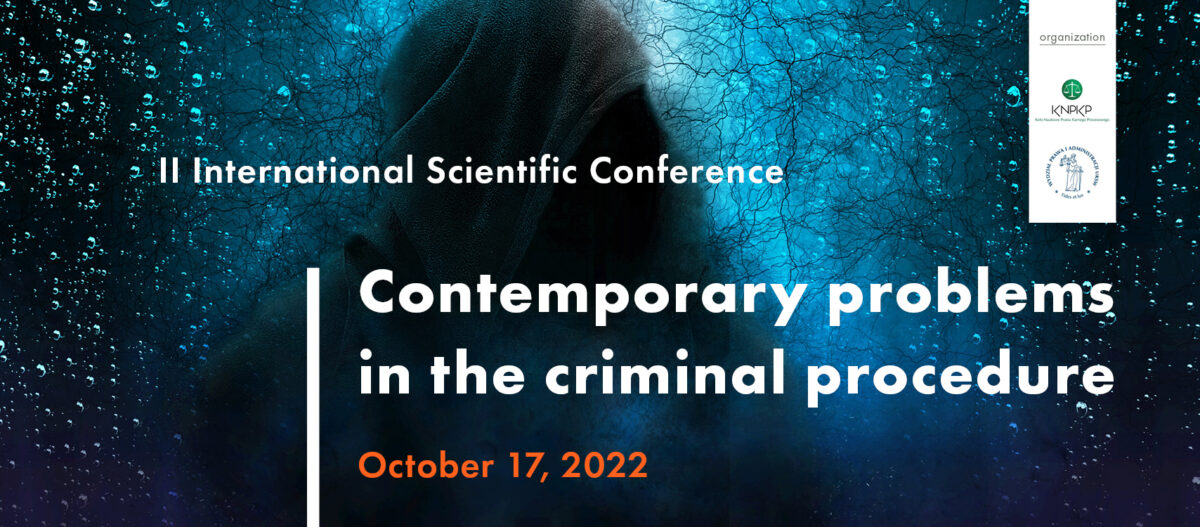International Scientific Conference “Conterporary problems in the criminal procedure”.
2022-10-26

On October 17, 2022 the second edition of the International Scientific Conference “Conterporary problems in the criminal procedure” was held. The event was conducted in remote form. The conference was organized on the initiative of the Scientific Circle of Criminal Procedural Law working at the Faculty of Law and Administration of Cardinal Stefan Wyszynski University in Warsaw.
The partners of the event were the Institute of Justice in Warsaw, the Ferenc Mádl Institute of Comparative Law, the Central European Academy – University of Miskolc and the Scientific Association for Comparative Law Poland.
The conference is an annual event organized by the Scientific Circle of Procedural Criminal Law of the WPiA UKSW since 2018. The first three editions had a national character, and since 2021 the conference is also aimed at foreign participants.
The event was ceremonially opened by Dr. Marcin Wielec, Prof. UKSW – Vice-Dean at the Faculty of Law and Administration of UKSW, Head of the Department of Criminal Procedure and supervisor of the Scientific Circle of Procedural Criminal Law. Professor Wielec wished fruitful debates to the speakers and participants of the event.
Moreover, he honored the conference with the opening speech of the first panel, which dealt with the issue of confessional secrecy in Polish criminal proceedings in the perspective of selected constitutional standards.
In addition, the event was attended by eminent practitioners, theoreticians and academics, PhD students and students from Hungary, Romania, Slovenia, Slovakia, Bosnia and Herzegovina, Hungary and Poland. Participants of the event had the opportunity to listen to papers on a variety of issues related to criminal procedure, the subject of which was the analysis of current legislative problems from a national and international perspective.
The proceedings of the conference were a unique opportunity to consider the prospects and directions of the development of procedural criminal law, not only in Poland, but also beyond the borders of our country. Therefore, the presented papers were an important starting point for an attempt to determine the differences and similarities between the legal orders of modern countries in the field of criminal procedural law. The topics of the speakers’ speeches referred, among other things, to the impact of a guilty plea on court proceedings, the youth brought before the courts and the resulting communication barrier, the regulation of social media in the context of criminal procedure. Speakers in their papers also referred to legal regulations and the most relevant issues affecting the countries they represented, including the legal framework of the crime of torture in the regulation and jurisdiction of Slovakia, manifestations of the right to privacy in Polish criminal law, the investigation and prosecution of cybercrime in Hungary, and the prognosis of atrocities in the continental legal environment: the case of Bosnia and Herzegovina.
The participants of the conference were thanked by Vice President Julia Starybrat, in place of the President of the Scientific Circle of Procedural Criminal Law of the WPiA UKSW, Tomasz Bojanowski, MA.
Titles of the papers presented during the conference:
dr hab. Marcin Wielec, prof. UKSW (Cardinal Stefan Wyszynski University in Warsaw) – The issue of the secret of confession in Polish criminal proceedings – perspective of selected constitutional standards
Prof. Dr. habil. Erika Roth PhD (University of Miskolc) – The effect of a guilty plea on the judicial proceedings
PhD Erika Varadi-Csema (University of Miskolc) – Youth before the judges – communication barriers to effectivenes
PhD Christian Mihes (University of Oradea) – Considerations on the use of e-evidence in criminal investigation
PhD János Tamás Papp (Pázmány Péter Catholic University) – Social Media regulation and its possible overlaps with criminal procedures
PhD Rebecca Lilla Hassanová PhD (Central European Academy/ Pan-European University) – Legislative framework of the crime of torture in the regulation and jurisdiction of Slovakia
M.A. Bartłomiej Oręziak (Cardinal Stefan Wyszynski University in Warsaw) – Manifestations of the Right to Privacy in Polish Criminal Law
M.A. Árpád Varga (Eötvös Loránd University) – Investigation and Prosecution of cybercrime in Hungary
M.A. Nedzad Smailagic (University of Zagreb) – Bargaining for Atrocity Crimes in a Continental Legal Setting: The Case of Bosnia and Herzegovina
M.A. Klaudia Łuniewska (Cardinal Stefan Wyszynski University in Warsaw) – The limits of the freedom of expression in Polish criminal proceedings
M.A. Iwona Lewandowska-Pierzynka (University of Warsaw) – Analysis of juvenile awareness of mediation
M.A. Nikolina Vidović (University of Novi Sad) – Usage of information technology in contemporary criminal procedurę
M.A. Nadia Majda (University of Silesia in Katowice) – Criminal law protection of religious freedom
M.A. Laszlo Dornfeld (University of Miskolc) – Current Issues of Gathering Digital Evidence in Hungary
M.A. Ewa Płocha (Cardinal Stefan Wyszynski University in Warsaw) – The possibility of the use of ‘real time’ remote biometric identification systems in the proposal for an Artificial Intelligence Act
M.A. Roland Szymczykiewicz (Cardinal Stefan Wyszynski University in Warsaw) – Procedural tools facilitating the performance of the function of a defence attorney in penal trials
M.A. Tomasz Bojanowski (Cardinal Stefan Wyszynski University in Warsaw) – Arguments for the reinstatement of investigating judge in Polish criminal proceedings
Roland Lindt (University of Miskolc) – An Unharmonized Area in Our Increasingly Harmonizing World: Criminal Law Regulation of Illegal Gambling in Different Legal Cultures







